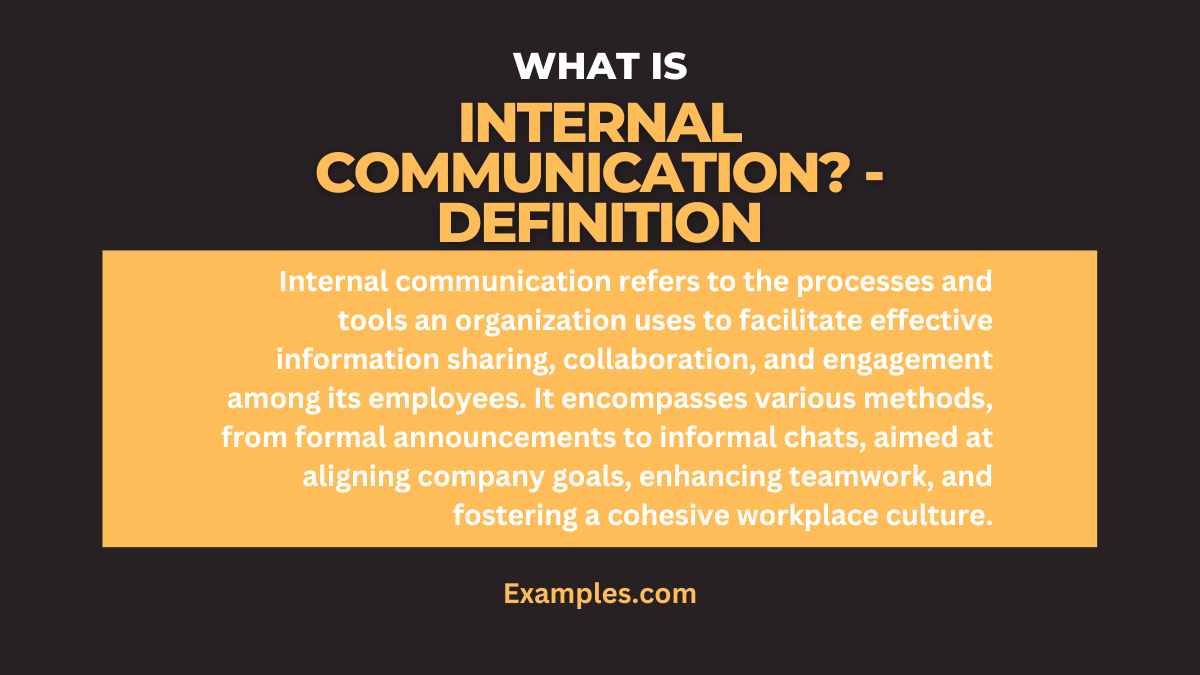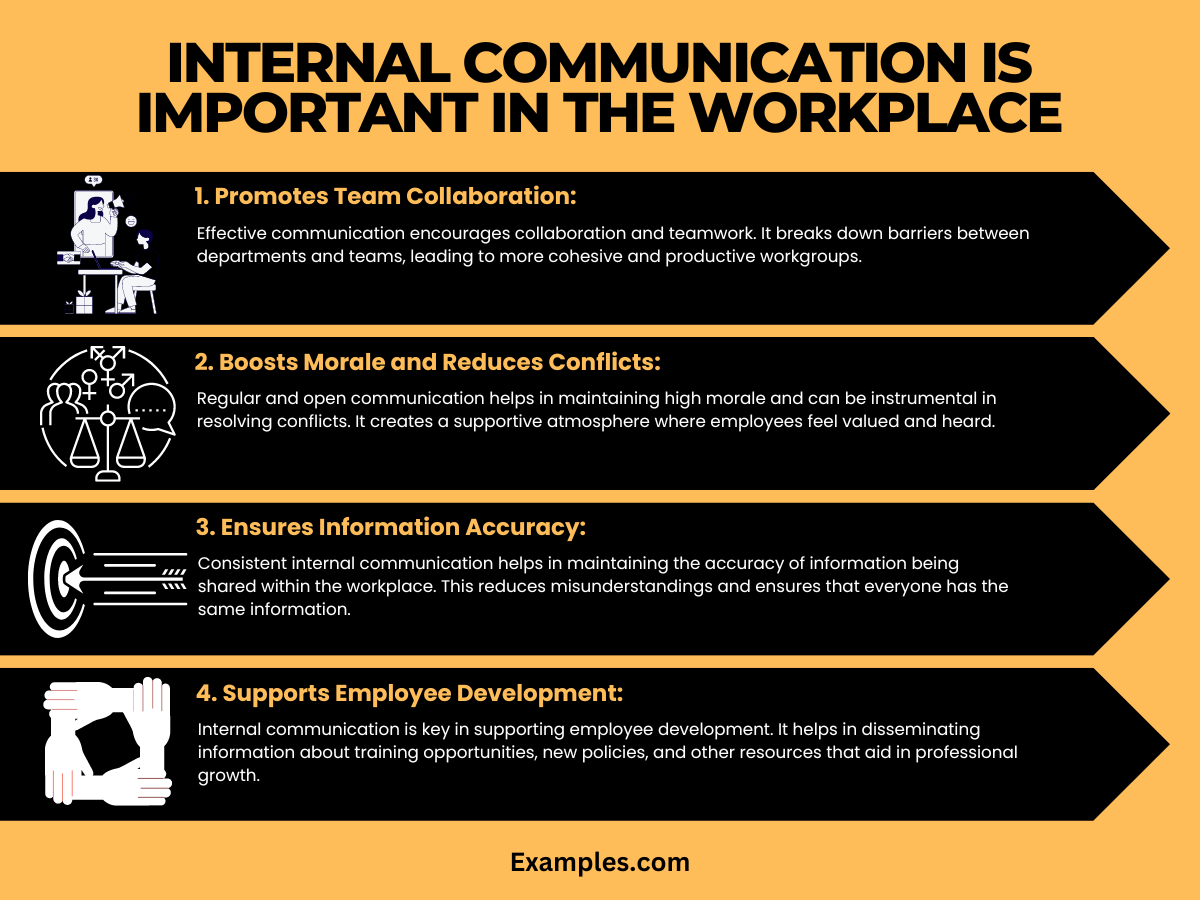Importance of Internal Communication – 9+ Examples
Dive into the pivotal world of Internal Communication with this detailed guide, showcasing its undeniable importance in modern organizations. Through practical Internal Communication Examples, understand how effective communication strategies can transform the workplace. From enhancing employee engagement to streamlining operations, this guide provides a comprehensive look at why internal communication is the linchpin of organizational success. Learn how to harness its power to foster a more connected, efficient, and dynamic work environment.
What is Internal Communication? – Definition

Internal Communication refers to the process by which information and ideas are exchanged within an organization. This encompasses everything from formal announcements and policies to informal conversations and feedback. It’s a crucial element of any business, enabling effective coordination and collaboration among employees. Good internal communication ensures that everyone is aligned with the company’s goals and objectives, enhancing overall productivity. Incorporating methods from Internal Communication Best Practices and using various Internal Communication Channels, organizations can foster a positive work environment and drive success.
10 Reasons Why Internal Communication is Important
Before diving into the specific reasons why internal communication is critical, it’s essential to understand its overarching impact. Effective internal communication is not just a tool for disseminating information; it’s a vital component that shapes every aspect of organizational life. From boosting employee morale to ensuring strategic alignment, the role of internal communication is multifaceted and deeply integrated into the fabric of a successful organization. In this section, we’ll explore the top ten reasons that highlight the Importance of Internal Communication, each demonstrating how effective communication practices are instrumental in building a resilient, cohesive, and high-performing workplace.

- Enhances Employee Engagement: Effective internal communication directly influences employee engagement. When employees feel informed and heard, their sense of belonging and commitment to the organization increases, leading to higher productivity and job satisfaction.
- Facilitates Better Decision Making: Transparent and clear communication ensures that employees have all the necessary information, enabling them to make informed decisions that align with the company’s goals and strategies.
- Builds a Positive Workplace Culture: Regular and positive internal communication helps in nurturing a healthy and inclusive workplace culture. It creates an environment of trust, respect, and collaboration.
- Improves Team Collaboration: Open lines of communication between departments and teams foster a collaborative spirit. This is essential for project success and innovation, as it encourages the sharing of ideas and knowledge.
- Aids in Conflict Resolution: Proactive communication can prevent misunderstandings and resolve conflicts efficiently. Addressing issues through open dialogue maintains harmony and productivity in the workplace.
- Supports Change Management: Communication plays a crucial role during organizational changes. Effectively communicating the reasons for changes and their expected outcomes helps in managing employee expectations and reduces resistance.
- Boosts Morale and Motivation: Recognizing and appreciating employees through internal communication enhances morale. Motivated employees are more likely to contribute positively to the organization’s objectives.
- Ensures Consistency of Information: Consistent communication across all levels prevents misinformation and ensures that everyone has a unified understanding of the company’s vision, policies, and procedures.
- Enhances Crisis Management: In times of crisis, effective internal communication is essential. It ensures that accurate and timely information is relayed, helping to manage the situation effectively and maintain employee trust.
- Promotes Organizational Alignment: Internal communication keeps all members of the organization aligned with its goals and values. This alignment is critical for achieving strategic objectives and maintaining a cohesive organizational direction.
Each of these reasons underscores the Importance of Internal Communication in creating a thriving, efficient, and collaborative work environment. Implementing robust internal communication strategies is key to realizing these benefits and driving organizational success.
Why Internal Communication Is Important for Businesses
In today’s fast-paced business environment, the role of internal communication cannot be overstated. It serves as a critical tool for managing and facilitating the seamless flow of information across various levels of a business. Here are key reasons why internal communication is essential for businesses:
- Aligns Organizational Goals: Effective internal communication ensures that all employees understand and are aligned with the business’s goals and objectives. This alignment is crucial for driving the business forward in a cohesive manner.
- Enhances Employee Productivity: Clear and consistent communication helps in clarifying roles and responsibilities, leading to enhanced productivity. Employees who are well-informed about their tasks and the company’s expectations are more likely to perform effectively.
- Improves Employee Engagement: Regular and meaningful communication boosts employee engagement. Engaged employees are more invested in their work and the success of the business, leading to reduced turnover rates and higher job satisfaction.
- Facilitates Change Management: Businesses constantly undergo changes, and internal communication plays a vital role in managing these changes effectively. It helps in reducing resistance, easing transitions, and ensuring employees are supportive of new initiatives.
- Supports Crisis Management: In times of crisis, effective internal communication is crucial for maintaining stability within the business. It ensures that employees receive accurate and timely information, which is essential for managing the situation effectively.
- Cultivates a Positive Corporate Culture: Internal communication is instrumental in shaping the corporate culture. A positive and open communication culture fosters trust, respect, and a sense of community among employees.
Why Internal Communication is Important in the Workplace
The importance of internal communication within the workplace goes beyond the mere exchange of information. It’s about building a network of effective communication that enhances the overall workplace environment. Here’s why internal communication is vital in the workplace:

- Promotes Team Collaboration: Effective communication encourages collaboration and teamwork. It breaks down barriers between departments and teams, leading to more cohesive and productive workgroups.
- Boosts Morale and Reduces Conflicts: Regular and open communication helps in maintaining high morale and can be instrumental in resolving conflicts. It creates a supportive atmosphere where employees feel valued and heard.
- Ensures Information Accuracy: Consistent internal communication helps in maintaining the accuracy of information being shared within the workplace. This reduces misunderstandings and ensures that everyone has the same information.
- Supports Employee Development: Internal communication is key in supporting employee development. It helps in disseminating information about training opportunities, new policies, and other resources that aid in professional growth.
- Improves Response to External Challenges: A workplace with strong internal communication is better equipped to respond to external challenges. Employees can quickly mobilize and adapt to market changes, customer demands, and other external factors.
In conclusion, internal communication is a linchpin in both the broader scope of business operations and the microcosm of the workplace. It is not just about conveying information but about building an environment where information is a tool for empowerment, collaboration, and growth. For businesses and workplaces alike, investing in robust Internal Communication Strategies and Internal Communication Channels is a step towards ensuring long-term success and sustainability.
Why is Internal Communication Important?
The importance of internal communication within an organization transcends mere information exchange; it is a strategic element that significantly impacts overall organizational health and success. Here’s an in-depth look at why internal communication is so crucial:
- Drives Organizational Alignment: Internal communication ensures that every employee, from top management to entry-level staff, understands and aligns with the organization’s mission, vision, and goals. This alignment is critical for cohesive and concerted efforts towards common objectives.
- Enhances Employee Engagement: A well-structured internal communication strategy significantly boosts employee engagement. When employees are regularly informed and their feedback is valued, they feel more connected and committed to the organization, leading to increased motivation and reduced turnover.
- Facilitates Effective Change Management: Organizations are constantly evolving, and effective internal communication is key to managing these changes smoothly. It helps in explaining the rationale behind changes, thereby reducing resistance and fostering a culture of adaptability and resilience.
- Builds a Strong Organizational Culture: The tone and quality of internal communication shape the organizational culture. A culture of openness, transparency, and trust leads to a more positive and productive work environment.
- Improves Operational Efficiency: Clear and concise internal communication reduces misunderstandings and errors, leading to improved operational efficiency. When employees have access to the right information at the right time, processes and decision-making become faster and more effective.
- Supports Employee Development: Internal communication plays a vital role in disseminating information related to training and development opportunities, aiding in the continuous growth and development of the workforce.
- Aids in Conflict Resolution: Effective communication can help in early detection and resolution of conflicts, maintaining harmony and collaboration within the workplace.
- Promotes Knowledge Sharing: A robust internal communication system encourages the sharing of knowledge, ideas, and best practices among employees, fostering innovation and continuous improvement.
- Enhances Crisis Management: In times of crisis, internal communication becomes even more critical. It ensures that accurate and timely information is provided, helping to manage the situation effectively and maintain employee confidence in the company’s leadership.
- Supports External Communication: Strong internal communication lays the foundation for effective external communication. Employees who are well-informed and engaged can better represent the organization to external stakeholders, customers, and the public.
In summary, internal communication is a key determinant of an organization’s health and effectiveness. Whether it’s through Internal Communication Platforms, Internal Communication Techniques, or regular meetings and updates, prioritizing internal communication is essential for any organization aiming for long-term success and a positive workplace atmosphere.
In conclusion, the Importance of Internal Communication in organizations cannot be overstated. It is the backbone of a thriving workplace, enhancing employee engagement, operational efficiency, and organizational alignment. This guide has provided insights and practical tips, emphasizing how effective internal communication is essential for business success and a positive work culture. Remember, clear communication is key to unlocking the full potential of any organization.



